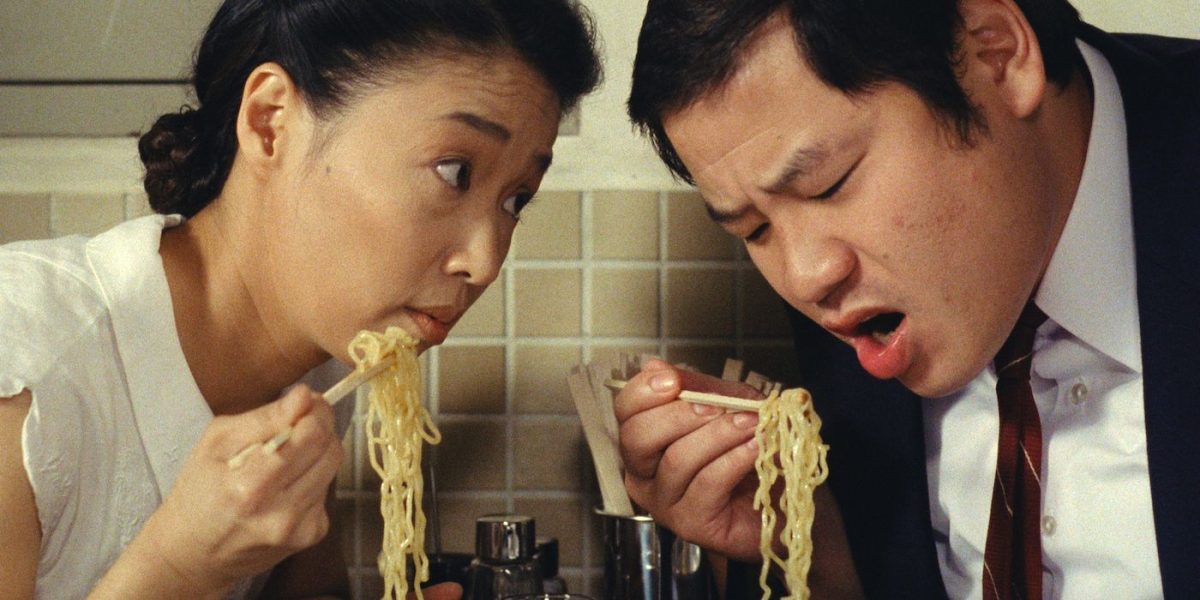
The Japanese Comedy That Was Marketed as a “Ramen Western”
Sep 28, 2023
The Big Picture
Tampopo is a strange and unique film that explores the roles of food and cinema in a satirical way, crossing class and cultural boundaries. The movie pays homage to American films, particularly Westerns and sports movies, using similar tropes and scenes to create a sense of parody and clever homage. The film understands the importance of food in bringing people together, creating a sense of community and connection while also teaching audiences to savor life’s flavors.
Many films have tackled the complex topic of human desire, but none have done so in such a strange and unique way as 1985’s Tampopo. The satiric Japanese Western, directed by Juzo Itami, explores the many roles that food plays across cultures, while simultaneously poking fun at the many tropes of American cinema. The movie draws a parallel between food and cinema as both are communal art forms that cross the boundaries of class and culture. The movie is a true and devoted love letter to the human sensory experience in all its forms and a very funny satire that is sure to appeal to anyone who has fallen in love with either food or film.
What Is ‘Tampopo’ About?
Tampopo tells the story of the titular character, played by Nobuko Miyamoto, a single mother running a struggling ramen shop that is frequently visited by troublemakers and drunks when two truckers stop in and decide to help her turn her luck around. The two truckers, Gorō and Gun, played by Tsutomu Yamazaki and a young Ken Watanabe in one of his earliest roles, feel great pity for Tampopo whose ramen is subpar, to say the least, and whose shop is rundown. It turns out that Gorō (Yamazaki) has advanced culinary knowledge and employs a variety of his friends (and even some enemies) to turn Tampopo’s shop around. Over the course of their collaboration, Gorō begins developing romantic feelings for Tampopo, though he is reluctant to share said feelings with her due to his stoic and nomadic nature.
In addition to the main storyline, the movie is often interrupted by quirky vignettes that depict the wide-ranging social utility of food in Japanese society. The most prominent and memorable of these vignettes sees a couple using food in the bedroom in various inventive ways to enhance their sex lives. The details of their identities are not given, nor are the circumstances of their love affair, further emphasizing the importance of food in the film and in their story. This story, in particular, gives some of the most erotically-charged and romantic imagery involving food in film history, so much so that A Girl Walks Home Alone director Ana Lily Amirpour has said that it “leaves her knees weak”. Other memorable side stories include a whimsical elderly woman who goes around a supermarket poking and squishing the produce while the manager chases her with a flyswatter and an old man who tenderly shares his ice cream cone with a toddler. The film is deeply playful and unpretentious while simultaneously being a profound meditation on the universality of human desire. It takes the smallest moments often taken for granted and turns them into something truly cinematic.
How Does ‘Tampopo’ Pay Homage to American Movies?
Image via Toho
As previously mentioned, Tampopo draws from American film tropes, specifically Westerns. Gorō physical appearance strongly resembles that of Clint Eastwood in the Dollars Trilogy, complete with a hat and cigarette. The truck that Gorō and Gun ride into town is their horse and even has a pair of steer horns attached at the front to hammer home the Western imagery that we are meant to associate with them. They follow the story trope of unnamed cowboys with mysterious pasts riding into a small town or village to save the townspeople from some threat facing them. The ending is also extremely reminiscent of Westerns, specifically the manner in which they leave, however, it would be a shame to spoil the ending to such a great film. Gorō also trains Tampopo to be a better ramen chef by teaching her skills outside the kitchen that she can apply to her cooking.
In a scene that is a clear nod to Rocky, Gorō has Tampopo run to build her endurance. The score is triumphant, alluding to the iconic score from the Sylvester Stallone classic. Tampopo’s training montage is shot and orchestrated similarly to those found in many American sports movies. The film lovingly pokes fun at the melodrama found in these films by applying the same tone and energy to scenes of Tampopo flipping noodles into bowls and repeatedly lifting heavy pots of hot water.
The couple having elaborate sex involving food also calls to mind noir character tropes. The man wears a white suit and hat not unlike Humphrey Bogart, and the woman is a clear homage to the femme fatale. They are effortlessly cool and appear to exist on the margins of society and are most likely involved in some kind of shady enterprise, especially considering the manner in which their journey meets its demise. They both possess great appetites, for each other, for delicious and eclectic food, and for the dangerous side of life. Tampopo has a clear love of American cinema, and like many great satires, shows its love for American films by parodying them in clever ways. Tampopo’s many nods to American movies are just subtle enough so that they work within the context of the story being told, but are an added source of delight for those who pick up on them.
RELATED: From ‘Oldboy’ to ‘Parasite’: 18 Essential Asian Movies Everyone Should Watch, According to Reddit
‘Tampopo’ Understands the Importance of Food
Image via Toho
In addition to the film’s many homages to American film tropes, Tampopo is also acutely aware of how food is used to bring people together, not only in a romantic way but also in a communal way. Besides the deep care that grows between Gorō and Tampopo stemming from their pursuit of the perfect ramen, her shop also becomes a place of community, both in its creation and in its completion. Enemies become friends as some of the town drunks come together to help revitalize the shop. Tampopo’s son, who is bullied early on in the film, gains friends after his mother’s new ramen shop begins flourishing. Gorō reaches out to old friends and mentors to help teach Tampopo the ways of ramen.
The whole film is a love letter to the creative process, especially that of creating good food that nourishes and comforts. The film takes care to show the people not just consuming their food, but savoring it. In many ways, Tampopo seeks to teach its audience how to savor life and all of its flavors, from the bitterness of loss and grief as is seen in Gorō’s character to the unexpected sweetness that flourishes from Gorō and Tampopo’s tender affection for each other. The film captures the whole spectrum of human experience, from love to sex to death. The cast is a great example of this, as both the main story and vignettes exhibit people of every age and the different experiences they have. Their experiences are wide-ranging, yet the movie never fails to point out how vastly similar they are to each other. The film ends on a beautiful, full-circle moment that really pulls the themes of the film together. At the end of the day, an ice cream cone is just as much a source of comfort and delight to an elderly man as it is to an infant, and that is a beautiful thing.
Publisher: Source link
"All Of This Came Out Of Nowhere": Lizzo Publicly Responds To Sexual Harassment Lawsuits After Being Dismissed From A Case
"We're continuing to fight the other claims."View Entire Post › Disclaimer: This story is auto-aggregated by a computer program and has not been created or edited by filmibee.Publisher: Source link
Dec 27, 2024
This Fan-Favorite Elf Quote Almost Didn’t Make It Into the Film
11. Determined to maintain the old school aesthetic, Favreau told Rolling Stone he didn’t want to make the film “a big CGI extravaganza," only using the technology to add some snow. “I like motion-control, models, matte paintings,” he explained. “It…
Dec 27, 2024
Guess The Missing Word: Christmas Song Titles
The holidays are here, and there's no better way to ring it all in than a seasonal song or two. So test your yuletide knowledge by identifying the missing word in the 14 holiday songs below. Good luck! Disclaimer: The…
Dec 26, 2024
Score an Extra 40% off Fashion & More
Our writers and editors independently determine what we cover and recommend. When you buy through our links, E! may earn a commission. Learn more. Even on Christmas Day, Anthropologie has your back with an extra 40% off sale that’s practically a…
Dec 26, 2024











